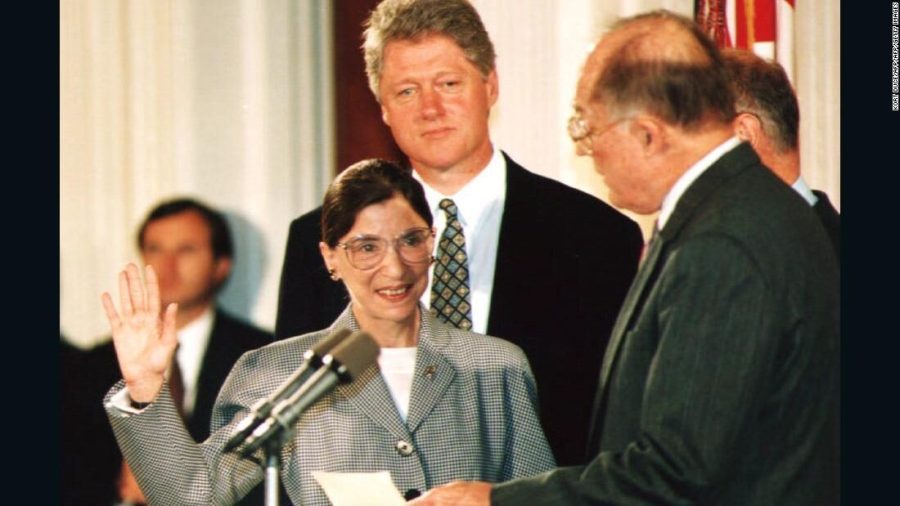In Memoriam: Justice Ruth Bader Ginsburg
In Memoriam: Justice Ruth Bader Ginsburg
September 23, 2020
Mourning is what shaped the days, months and years after 9/11. It’s what created Boston Strong in the wake of the Boston Marathon Bombing. It’s what we carry with us today, as we think of our lives before COVID-19, masks on our faces and memories dancing in our minds. On Friday night, when millions of phones lit up with the notification that Justice Ruth Bader Ginsburg had died, it was no different.
During my junior year of high school, I took a class called Presidency. In the days leading up to the election, the idea that Donald Trump would be our president seemed so far-fetched that it was almost laughable. It seemed to be unanimously agreed upon across all party lines that Hillary Clinton would be our next president. Since then, we’ve watched an underqualified leader blindly forge a legacy of bigotry, chaos and pain. Little girls waiting to see Hillary Clinton shatter the glass ceiling now have to deal with an accused rapist as Commander-in-Chief.
What I took away most from my Presidency class was this fact: the most important and impactful thing a president can do is appoint a Supreme Court justice.
Born on March 15, 1933 in Brooklyn, Ginsburg was a pioneer for human rights and proud feminist, fighting for equality until the day she died. From a young age, her mother instilled in her the importance of education.
She excelled through high school and landed herself a spot in Cornell’s graduating class of 1954, where she finished at the top of her class. She delayed law school to start a family but eventually enrolled into Harvard Law School, where she was one of only nine women in her class.
Here, Ginsburg faced unrelenting gender-based discrimination. From the very top administrators at the school all the way down to the peers in her class, she was made to believe that she had taken a man’s spot and had no business being in law school. In the face of this, she also juggled motherhood and the weight of her husband’s cancer diagnosis. After her husband graduated Harvard Law and accepted an offer in New York City, Ginsburg opted to spend her last year of law school at Columbia. On par with her previous track record, Ginsburg finished top of her class.
Despite having two Ivy League degrees under her belt, her gender overshadowed her accomplishments. A woman seeking highbrow lawyer jobs in the 1960s did not sit well with potential employers.
Only after a stellar recommendation from a favored law professor did she land a job with the U.S. District Judge Edmund L. Palmieri. Over the next couple of years, she found that although she had job offers from other firms, her pay was significantly lower than her male counterparts. She refused to sink down with the weight of the patriarchy and instead pursued a tenure at Columbia Project on International Civil Procedure. Next, she turned to teaching.
She first taught at Rutgers University Law before returning back to Columbia Law. Here, she went on to earn the first female tenure position in the school’s history.
Ginsburg also directed the Women’s Rights’ Project of the American Civil Liberties Union, where she pioneered for women’s rights and battled gender-based discrimination.
By the late 1980s, Ginsburg made clear to the world that she was a civil rights weapon. In 1980, Jimmy Carter opted to appoint her to the U.S. Court of Appeals for the District of Columbia. She quickly found herself rising the ranks of the American judicial system. Just 13 years later, in 1993, Bill Clinton appointed her to the Supreme Court of the United States. As the second female ever to be appointed to the Supreme Court, Justice Ginsburg had big shoes to fill. Yet, it seemed everything in her life up to this point had prepared her to be in a room filled with men and nonetheless, she made her voice heard.
We mourn he loss because without her, women would not have a fair chance to be enrolled in military academies. Without her, there may be no initiative to end the gender wage pay gap. Without her, there would not have been an emphasis on the reproductive rights of women. Thanks to her, same sex marriage is legal. Thanks to her, there is a push to end racial discrimination in voting.
Democracy should not hinge on the shoulders of an 87-year-old woman. Ginsburg persevered in the face of blatant sexism and chronic bigotry. She succeeded not in spite of but because of the gender-based discrimination that shaped her life. For this, we must take time to mourn her.
As we look forward, we must hope that partisan lines can be erased, just for one moment, so that the same respect that was given to President Trump in his nomination of Neil Gorsuch will be given to his successor. The people should choose the president. The president should choose the next Justice.










